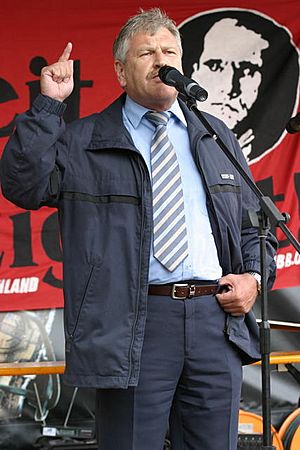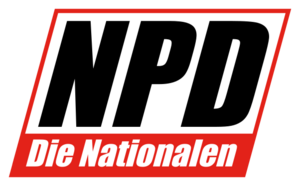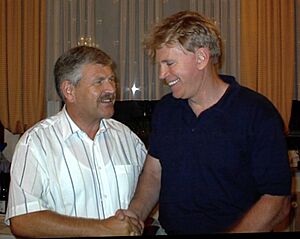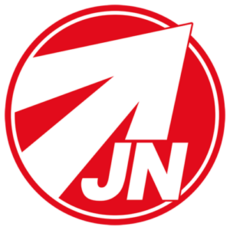National Democratic Party of Germany facts for kids
Quick facts for kids
The Homeland
Die Heimat
|
|
|---|---|
 |
|
| Party Chairman | Frank Franz |
| Founder |
|
| Founded | 28 November 1964 |
| Merger of |
|
| Headquarters | Carl-Arthur-Bühring-Haus, Seelenbinderstrasse 42, 12555 Berlin |
| Newspaper | Deutsche Stimme |
| Youth wing | Junge Nationalisten |
| Membership | |
| Ideology |
|
| Political position | Far-right |
| European affiliation | Alliance for Peace and Freedom |
| European Parliament group | Non-Inscrits |
| Colors |
|
| Slogan | Die soziale Heimatpartei (The Social Homeland Party) |
| Bundestag |
0 / 736
|
| Bundesrat |
0 / 69
|
| State Parliaments |
0 / 1,897
|
| European Parliament |
0 / 96
|
| Heads of State Governments |
0 / 16
|
The Homeland (German: Die Heimat), once known as the National Democratic Party of Germany (NPD), is a political party in Germany. It is considered a far-right party. This means its ideas are often very traditional and sometimes extreme. The party has also been called neo-Nazi and ultranationalist. This means they have ideas similar to the Nazis and believe their own nation is much better than others.
The party started in 1964. It was formed after another party called the German Reich Party. The Homeland party says it is Germany's "only important patriotic group." Germany's security agency, the Federal Office for the Protection of the Constitution, watches the party. They see its ideas as a "threat to the country's rules."
Since it began, The Homeland has never won enough votes to get seats in Germany's main parliament, the Bundestag. However, it has won seats in state parliaments 11 times. This happened mostly in the late 1960s and in some eastern German states after 2004. The party changed its name to "Die Heimat" (The Homeland) in June 2023.
Contents
Party History
Early Years (1960s)
In the 1950s, after World War II, new right-wing parties in West Germany did not get much support. But in November 1964, different right-wing groups came together to form the NPD. One of the founders was Adolf von Thadden. He led the party from 1967 to 1971.
Under von Thadden's leadership, the NPD became more successful in the late 1960s. They won seats in local governments across West Germany. In 1966 and 1967, the NPD won seats in several states like Bavaria and Hesse. This happened when Germany's economy was slowing down. People were also unhappy with new youth movements.
The NPD tried to fill a gap in German politics. They also gained support because some people were against the growing number of immigrants. Others worried the government would give up land Germany lost after World War II. However, the NPD never reached the 5% of votes needed to enter the German Parliament. Their closest was 4.3% in 1969.
Later Years (1970s-2000s)
After the economy improved, many voters who supported the NPD went back to other parties. In the 1970s, the NPD became less popular. They also had disagreements within the party.
In the mid-1980s to early 1990s, interest in the party grew a little because of debates about immigration. But they only had small wins in local elections.
In 2011, another nationalist party, the German People's Union, joined with the NPD. For a short time, the party was called "NPD – The People's Union."
Recent Events
In September 2019, an NPD politician, Stefan Jagsch, was chosen as a local representative in Altenstadt, Hesse. This was surprising because members of other parties also voted for him.
In June 2023, the party officially changed its name to "Die Heimat" (The Homeland). Most party members voted for this change.
Efforts to Ban the Party
In 2001, the German government tried to ban the NPD. Germany's highest court can ban parties if they are found to be "against the country's rules." But the court rejected the ban in 2003. This was because many of the party's top leaders were actually secret agents or informants for the German government.
The court found it hard to tell if the party's actions were real or if they were influenced by these agents. The court said that the government's presence at the party's top level made it impossible to decide fairly.
The Green Movement
The Homeland party has recently shown support for the green movement. This is a new strategy for the party to try and gain more supporters. Historically, the German Greens party has been the main supporter of environmental issues in Germany.
The Homeland party's supporters of the green movement are in favor of local food. But they are against genetically modified foods (GMOs), pesticides, and large-scale animal farming. Some people worry that buying local organic food might accidentally support far-right groups.
To help people understand the difference, a government department created a brochure. It is called "Nature Conservation Versus Right-wing Extremist." This brochure helps consumers tell the difference between the two political groups.
Party Ideas and Beliefs

The Homeland is a neo-Nazi political party. It calls itself a party for "grandparents and grandchildren." This is because many older Germans, who were part of student movements in the 1960s, strongly disagree with the party's ideas.
The party believes in social security for Germans. They also want to control what they call the "liberal-capitalist system." They do not like this system.
The Homeland party thinks that NATO does not truly represent the interests of European people. They also believe the European Union is too much like the old Soviet Union. Even though they criticize the EU, they do not want Turkey to join it. The party wants to work with other nationalist groups in Europe. The Homeland is also strongly against Zionism, often criticizing the actions of Israel.
The Homeland party believes that Germany is bigger than its current borders. They want Germany to get back land it lost after World War II. The German government officially gave up this idea in 1990.
Germany's security agency says that the NPD wants to get rid of Germany's parliamentary democracy. They want to replace it with a different system. The agency says the party's ideas are racist, against Jewish people, and try to change history.
International Connections
The Homeland party has met with people who support white nationalism. For example, Udo Voigt, a former leader of the NPD, met with David Duke from the United States. Duke is a white nationalist and activist.
The Homeland also has ties with a Romanian group called Noua Dreaptă.
Connections with Croatian Far-Right
The party also has links with far-right parties in Croatia. In 2017, a member of the NPD, Alexander Neidlein, joined a march in Croatia. This march was to support former American president Donald Trump. During the march, members waved NPD and American flags. They also shouted a salute linked to a group called the Ustasha. The U.S. embassy in Croatia strongly condemned the march. They said they did not want to be linked to the Ustasha.
In 2018, a Croatian politician, Željko Glasnović, attended a party meeting of the NPD. He showed his support for the party.
Youth Wing
The Junge Nationalisten (JN) is the official youth group of The Homeland party. It was founded in 1967. The JN follows the main party's ideas but expresses them more strongly.
Germany's Office for the Protection of the Constitution watches the JN. They classify the group as right-wing extremists. The JN publishes a magazine called The Activist. In it, they say they are the "national revolutionary wing" of The Homeland party. They criticize those in the party who focus too much on winning elections. Instead, they believe in "resistance and criticism."
The JN also has connections with other neo-Nazi groups in Europe. These include the Nordic Resistance Movement and the National Corps of Ukraine.
Party Leaders
| Leader | Tenure | |
|---|---|---|
| 1 | Friedrich Thielen | 1964–1967 |
| 2 | Adolf von Thadden | 1967–1971 |
| 3 | Martin Mussgnug | 1971–1990 |
| 4 | Günter Deckert | 1991–1996 |
| 5 | Udo Voigt | 1996–2011 |
| 6 | Holger Apfel | 2011–2013 |
| 7 | Udo Pastörs | 2013–2014 |
| 8 | Frank Franz | 2014–present |
Election Results
Federal Parliament (Bundestag)
| Election year | Constituency | Party list | Seats won | ||||
|---|---|---|---|---|---|---|---|
| Votes | % | +/– | Votes | % | +/– | ||
| 1965 | 587,216 | 1.8 | 664,193 | 2.0 |
0 / 518
|
||
| 1969 | 1,189,375 | 3.6 | 1,422,010 | 4.3 |
0 / 518
|
||
| 1972 | 194,389 | 0.5 | 207,465 | 0.6 |
0 / 518
|
||
| 1976 | 136,023 | 0.4 | 122,661 | 0.3 |
0 / 518
|
||
| 1980 | 68,096 | 0.2 |
0 / 497
|
||||
| 1983 | 57,112 | 0.1 | 91,095 | 0.2 |
0 / 498
|
||
| 1987 | 182,880 | 0.5 | 227,054 | 0.6 |
0 / 497
|
||
| 1990 | 190,105 | 0.4 | 145,776 | 0.3 |
0 / 662
|
||
| 1998 | 45,043 | 0.1 | 126,571 | 0.3 |
0 / 669
|
||
| 2002 | 103,209 | 0.2 | 215,232 | 0.4 |
0 / 603
|
||
| 2005 | 857,777 | 1.8 | 748,568 | 1.6 |
0 / 614
|
||
| 2009 | 768,442 | 1.8 | 635,525 | 1.5 |
0 / 620
|
||
| 2013 | 634,842 | 1.5 | 560,828 | 1.3 |
0 / 630
|
||
| 2017 | 45,239 | 0.1 | 176,715 | 0.4 |
0 / 709
|
||
| 2021 | 1,089 | 0.0 | 64,608 | 0.1 |
0 / 709
|
||
European Parliament Elections
| Election year | # of overall votes |
% of overall vote |
# of overall seats won |
+/– |
|---|---|---|---|---|
| 1979 | - | - | - | - |
| 1984 | 198,633 | 0.8 |
0 / 81
|
|
| 1989 | - | - | - | - |
| 1994 | 77,227 | 0.2 |
0 / 99
|
|
| 1999 | 107,662 | 0.4 |
0 / 99
|
|
| 2004 | 241,743 | 0.9 |
0 / 99
|
|
| 2009 | - | - | - | - |
| 2014 | 301,139 | 1.0 |
1 / 99
|
|
| 2019 | 101,323 | 0.3 |
0 / 99
|
Best State Election Results
| State | Seats / Total | % | Position/Gov. | Year | Lead Candidate |
|---|---|---|---|---|---|
| Baden-Württemberg |
12 / 127
|
9.82 (#3) | Opposition | 1968 | Wilhelm Gutmann |
| Bavaria |
15 / 204
|
7.42 (#3) | Opposition | 1966 | Siegfried Pöhlmann |
| Berlin |
0 / 149
|
2.56 (#8) | No seats | 2006 | Udo Voigt |
| Brandenburg |
0 / 88
|
2.56 (#6) | No seats | 2009 | Klaus Beier |
| Bremen |
8 / 100
|
8.8 (#4) | Opposition | 1967 | Otto-Theodor Brouwer |
| Hamburg |
0 / 120
|
3.9 (#4) | No seats | 1966 | unknown |
| Hesse |
8 / 96
|
7.9 (#4) | Opposition | 1966 | Heinrich Fassbender |
| Lower Saxony |
10 / 149
|
7.0 (#3) | Opposition | 1967 | Adolf von Thadden |
| Mecklenburg-Vorpommern |
6 / 71
|
7.3 (#5) | Opposition | 2006 | Udo Pastörs |
| North Rhine-Westphalia |
0 / 200
|
1.08 (#4) | No seats | 1970 | unknown |
| Rhineland-Palatinate |
4 / 100
|
6.9 (#4) | Opposition | 1967 | Fritz May |
| Saarland |
0 / 51
|
4.0 (#5) | No seats | 2004 | Peter Marx |
| Saxony |
12 / 124
|
9.2 (#4) | Opposition | 2004 | Holger Apfel |
| Saxony-Anhalt |
0 / 105
|
4.6 (#5) | No seats | 2011 | Matthias Heyder |
| Schleswig-Holstein |
4 / 73
|
5.85 (#4) | Opposition | 1967 | Karl-Ernst Lober |
| Thuringia |
0 / 90
|
4.3 (#6) | No seats | 2009 | Frank Schwerdt |
See also
 In Spanish: La Patria (partido político) para niños
In Spanish: La Patria (partido político) para niños
- Far-right politics in Germany
- German nationalism
- Politics of Germany
- List of political parties in Germany
 | James Van Der Zee |
 | Alma Thomas |
 | Ellis Wilson |
 | Margaret Taylor-Burroughs |




